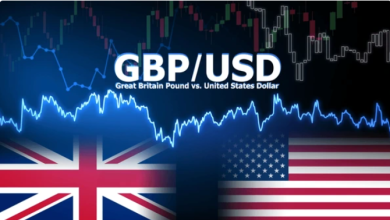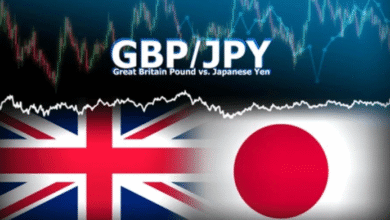Earnings Calendar – U.S. Banks Set The Tone
Q1 earnings season has kicked off in the US, amidst the tariff drama. Tariffs loom large over this earnings season, even if most reciprocal tariffs are on pause. The question for investors is whether the disruption caused by tariffs on China and elsewhere, even if they are delayed, will lead to profit destruction for companies.
Ahead of this earnings season a few developments are worth noting:
- Amazon cancelled some inventory orders from China due to 100%+ tariffs.
- Chinese sellers on Amazon, which make up around half of Amazon’s sellers, could leave the platform or hike prices for US consumers, according to reports. They generate approx. $35bn of revenue per year. It is hard to see how Amazon can give a positive update about its outlook, with the US and China locked in an intense trade war.
- Walmart was also amending orders for Christmas ornaments and telling suppliers not to attach price tags, since the prices are still unknown.
Earnings downgrades ahead of Q1 results
Ahead of earnings season, analysts had lowered their estimates for earnings per share (EPS) for S&P 500 companies by more than average over the last 5, 10 and 15- years. The sectors with the largest decrease in EPS estimates include materials and consumer discretionary sectors, both sectors that are exposed to global economic growth and to tariffs. Utilities were the only sector without an EPS downgrade.
Interestingly, although tech stocks have been heavily sold off this year, the S&P 500’s tech sector had the smallest downgrade to their EPS forecasts. This suggests that big tech could be protected from the worst effects of an economic recession.
Banks in focus
The financial sector is in focus for the next couple of weeks, as 60% of companies that are set to report earnings are from the financial sector. Overall, the financial sector is expected to report earnings growth of 2.3% for Q1, with consumer finance, capital markets, banks and financial services expected to report the highest levels of growth in the sector.
Investment banking and capital markets activity like asset management are expected to see a boost to earnings for Q1. This part of the industry could see earnings growth of 10% for the first three months of the year. The insurance business is expected to report a decline in earnings growth, due to higher costs to settle policy holder claims.
What to expect from JP Morgan
On Friday, JP Morgan will be the highlight of earnings season so far. Jamie Dimon’s comments on reciprocal tariffs were seen as pivotal to Donald Trump’s decision to press pause on Wednesday. We know that Dimon thinks tariffs will cause a recession, so the highlight of his conference call on Friday will be what he makes of the pause, and how he thinks things could play out in the future. The market will not only focus on his views about the outlook for JPM’s revenues and profit levels, but also his view on the economy and financial markets. Dimon is like a litmus test for the whole of Wall Street. If he sounds upbeat about the shift in tariff policy, then it could help risky assets to rally in the coming days and weeks.
JPM is expected to boost credit loss provisions, in a sign that the US’s biggest bank is expecting an economic downturn. However, trading revenue could help to protect profits in Q1. Optimism about a boost to deal making this year could be scaled back as M&A deals continue to remain thin on the ground. IPOs are also being pulled after the recent market turmoil, including Klarna. In recent weeks, revenue, and profit estimates for JPM have risen slightly, and the bank is expected to report revenue of $44.29bn for last quarter, with EPS at $4.61.
The stock has struggled this year, even with Wednesday’s rally it is still lower by 2.7% YTD. It is looking extremely cheap on a P/E basis, its 12-month forward P/E ratio is significantly lower than the average for the S&P 500 at 12.8. If JPM and Dimon paint a positive picture of the future, then this stock could shine.
Delta: tariff pause could see sales could pick up in Q2
Finally, a word on Delta Airways who reported earnings on Wednesday before news of the pause on reciprocal tariffs broke. The company withdrew its 2025 guidance due to policy uncertainty and said that it plans to keep second half capacity growth flat. The company noted that summer bookings remain strong but said that a global trade war had stalled sales. With tariffs on pause, this could lead to a pickup in sales growth for Delta in Q2.
Interestingly, the Delta CEO said that the company would not be paying any tariffs on planes made by Airbus, which puts pressure on Airbus not to lift prices for customers once tariffs are implemented in 3 months’ time. Delta is mindful of costs for this year and said that it is pulling back expansion plans as volatility weighs on travel demand.
For Q1, the company reported revenues that were in line with estimates at $12.97bn, and net income surprised to the upside at $298mn. This helped the share price to rally by a quarter on Wednesday. This move could be scaled back in the coming days, as investors weigh up what a pause in tariffs means for financial markets and economic growth.
Chart 1: JP Morgan, daily chart

Source: XTB
The material on this page does not constitute financial advice and does not take into account your level of understanding, investment objectives, financial situation or any other specific needs. All information provided, including opinions, market research, mathematical results and technical analyzes published on the Website or transmitted To you by other means, it is provided for information purposes only and should in no way be construed as an offer or solicitation for a transaction in any financial instrument, nor should the information provided be construed as advice of a legal or financial nature on which any investment decisions you make should be based exclusively To your level of understanding, investment objectives, financial situation, or other specific needs, any decision to act on the information published on the Website or sent to you by other means is entirely at your own risk if you In doubt or unsure about your understanding of a particular product, instrument, service or transaction, you should seek professional or legal advice before trading. Investing in CFDs carries a high level of risk, as they are leveraged products and have small movements Often the market can result in much larger movements in the value of your investment, and this can work against you or in your favor. Please ensure you fully understand the risks involved, taking into account investments objectives and level of experience, before trading and, if necessary, seek independent advice.







